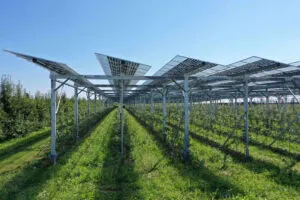Agri-PV system for apples tested in Germany

The project will investigate to what extent Agri-PV systems can protect plants and fruit from harmful environmental influences such as hail, heavy rain, sunburn, frost or extreme temperatures.
BayWa r.e. and the German Fraunhofer Institute for Solar Energy Systems ISE, together with other research partners, have built the first Agri-PV research facility for apples and espalier fruit at the Nachtwey organic fruit farm in Gelsdorf in Rhineland-Palatinate, Germany.
Increase climate resilience in fruit growing
The primary objective of the project is to increase climate resilience in fruit growing and to ensure safe and sustainable apple production with additional solar power generation. The p[roject will run for five years and will investigate numerous factors on eight varieties of apple.
The project will begin by comparing apple production at the same site under three different crop protection systems: Foil Protection (non-rain permeable), Hail Protection (rain permeable), and Agri-PV with fixed light permeable PV modules (non-rain permeable) and tracked PV modules (rain permeable when needed).
The project will investigate to what extent Agri-PV systems can protect plants and fruit from harmful environmental influences such as hail, heavy rain, sunburn, frost or extreme temperatures.
Also read: BayWa explores use of solar modules on cropland
Light management options

It will also explore light management options by testing different PV module configurations to identify the impact on plant growth and agricultural yields. Finally, the project will take into account the landscape aesthetics, economic efficiency, social compatibility as well as crop production parameters.
Stephan Schindele, Head of Product Management Agri-PV at BayWa r.e. comments on the project: “We see Agri-PV as a long-term solution to help farmers adapt to the consequences of climate change. We can preserve the existing ecosystem and even enhance it through synergy effects and solar power generation.”
The Agri-PV project in Gelsdorf also aims to demonstrate the economic benefits for farmers. These include permanently lower and more predictable energy costs, lower investment costs in crop protection, and lower operational and waste disposal costs.
System charges electric Fendt 100 Vario tractor
The electricity generated by the Agri-PV system can be used during the time before and after apple production. The battery-electric tractor Fendt 100 Vario provided by AGCO is charged with the electricity from the system, while the energy is also used to supply the watering system with Agri-PV’s own electricity. The cold storage facility is already supplied with green electricity from a rooftop PV system. Overall, the implementation of an operational energy concept seeks to significantly reduce CO2 emissions on the farm through solar electrification.
Join 17,000+ subscribers
Subscribe to our newsletter to stay updated about all the need-to-know content in the agricultural sector, two times a week.



